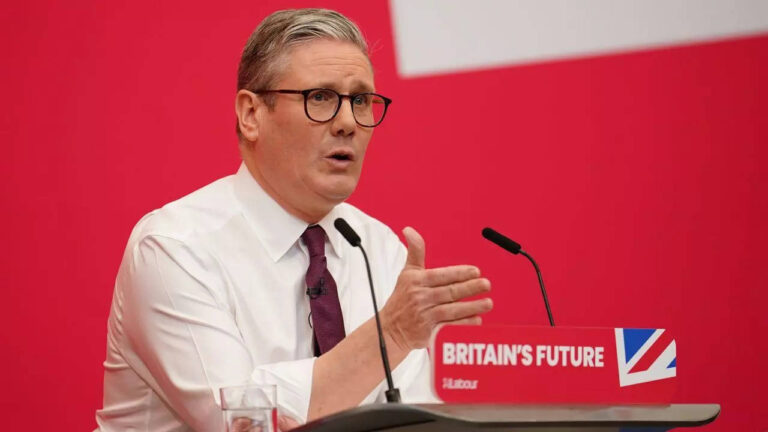The first nationwide vote since Prime Minister Boris Johnson handed his Conservative party a landslide victory in 2019 came after Chancellor Rishi Sunak suddenly called an election six months earlier than planned – a gamble that looks set to backfire spectacularly, with exit polls pointing to a heavy defeat for his right-wing party.
“My father was a tool maker and my mother was a nurse.”
The centre-left Labour Party is expected to win a historic victory in the first general election since 2005.
Exit polls have shown that 61-year-old Labour leader Keir Starmer is set to become the next occupant of No. 10 Downing Street as leader of Parliament’s largest party.
Results from 650 British constituencies were announced overnight, with the winning party expected to secure 326 seats – the threshold for a parliamentary majority – by dawn on Friday.
Opinion polls suggest voters could punish 14 years of chaos in power and expel a string of ministers, raising doubts Mr Sunak himself may not be safe – making him the first sitting prime minister to fail to retain his seat at a general election.
What you need to know about Keir Starmer
- Keir Starmer was born in London in 1962 and grew up in Oxted, Surrey, to a toolmaker father and an NHS nurse mother.[3]
- He was politically active from an early age, joining the Young Socialists of the Labour Party at the age of 16.
- Mr Starmer has an excellent academic background, holding a Bachelor of Laws from the University of Leeds and a Postgraduate Diploma in Civil Law from the University of Oxford.
- Before entering politics, Starmer had a successful career as a human rights lawyer, served as human rights adviser to the Northern Ireland Police Commission and was appointed Queen’s Counsel in 2002.
- Starmer served as Director of Public Prosecutions from 2008 to 2013, and presided over high-profile cases including the murder of Stephen Lawrence.
- He was elected to the House of Commons in 2015 as the MP for Holborn and St Pancras, a safe Labour constituency.
- Starmer supported the unsuccessful “Make Britain Stronger in Europe” campaign during the 2016 Brexit referendum, but later argued for a second referendum under the leadership of Jeremy Corbyn.
- After Corbyn’s resignation, Starmer won the 2020 Labour leadership election on a left-wing platform, establishing himself as a more centrist, pragmatic leader.[3]
- As Labour leader, Starmer has sought to move the party away from the Corbyn era by emphasising a more professional, election-winning approach.[1][4]
- A known vegetarian and self-described socialist, Starmer has a polarizing reputation and is seen by some as leaning to the right in his quest for power.
The main policies of Keir Starmer, candidate for the next British Prime Minister, are as follows:
- Economic stability: Starmer promised to “deliver economic stability” by sticking to “tough spending rules” and focusing on economic growth. He avoided big spending promises, instead emphasizing fiscal responsibility.
- Improving the NHS: Starmer plans to “reduce waiting times in the NHS” by adding 40,000 evening and weekend appointments each week, aimed at tackling the NHS’s problems of staff shortages and patient backlogs.
- Border security: Starmer wants to “set up a new border command” to crack down on illegal immigration and smuggling rings. He has said he is willing to agree immigration quotas with the EU.
- Energy nationalisation: Starmer has promised to set up a new publicly owned clean electricity company, Great British Energy, as part of Labour’s green energy transition plan.
- Tackling anti-social behaviour: Starmer promised to “crack down on anti-social behaviour” as part of his law and order policy.
- Education funding: Mr Starmer promised to “recruit 6,500 new teachers” in core subjects to address staffing shortages in the education system.
- Foreign policy: Starmer has pledged a “new strategic partnership” with India, including pursuing a free trade agreement, and plans to end arms sales to Israel and move towards recognition of a Palestinian state.
End of article

